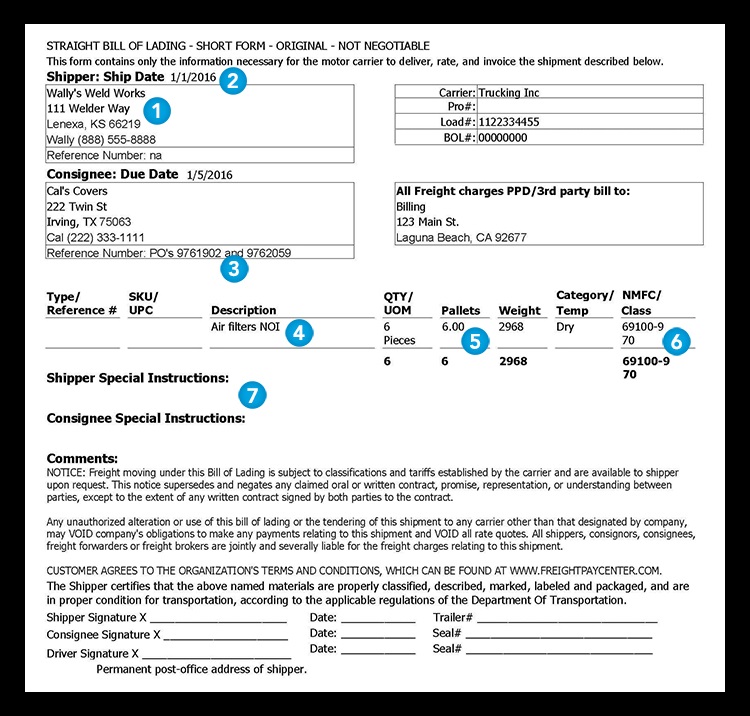Bill of lading definition
The bill of lading (BOL) is a required document to move a freight shipment. The bill of lading is legally binding and provides the driver and the carrier with all the details needed to process and invoice the freight shipment correctly. The BOL works as a receipt of freight services, a contract between a freight carrier (the party transporting the goods) and shipper (the party sending the goods), it also acts as a document of title.
Automate BOLs with Freightquote® by C.H. Robinson
We improve the efficiency of your business by automatically creating bills of lading during the quoting and booking process. Remember: The BOL should be provided to the carrier at pickup, as well as attached to the packaged freight.
Book a shipmentFreight bill of lading (BOL) example

Information included in a freight bill of lading
The BOL contains detailed information about the goods being shipped, the origin and destination of the shipment, the parties involved, and the terms and conditions of the transportation agreement. Here are the required fields that will be populated in your BOL after booking your shipment online with Freightquote:
- 1. Names and addresses: The full names and addresses of both the shipper and receiver (consignee) should be legible and easy to locate on the document.
- 2. Date: This is the pickup day, and it may be needed as a reference to track your freight or when you reconcile shipping invoices.
- 3. Purchase orders or special reference numbers: These numbers may be important to your business or a necessary reference for freight to be released at pickup or accepted at delivery.
- 4. Description of items: Shippers should note the number of shipping units, the dimensions and weight, as well as information about the material and its makeup.
- 5. Packaging type: Note whether you are using cartons, crates, pallets and/or drums when shipping.
- 6. NMFC freight class: Freight classes can impact the cost of your shipment. Freight shipments are broken down into 18 classes based on weight, dimensions, density, storage capability, ease of handling, value and liability.
- 7. Special instructions: Note any instructions for the carrier, but not requests for extra services like lift gate or delivery notifications.
- 8. Department of Transportation hazardous material designation:While the example above does not include this, hazardous shipments must be clearly cited, and special rules and requirements apply when shipping.
Do you have a shipment to book?
Frequently asked questions: Bill of lading (BOL)
Why are BOLs important?
Bills of lading are required for most types of freight shipments. They are an important part of the shipping process because they help ensure goods are delivered safely and efficiently.
What purpose does the BOL serve?
The accuracy of your bill of lading is critical to the timely and efficient routing and transportation of your freight.
- Contract of Carriage: It serves as a contract between the shipper and the carrier, outlining the rights, responsibilities, and liabilities of each party involved in the transportation process.
- Receipt of Goods: The BOL acts as a receipt for the goods being shipped, acknowledging that the carrier has taken possession of the cargo.
- Title of Goods: The BOL can also serve as a document of title, meaning it represents ownership or control of the goods. It allows the holder of the BOL (such as the consignee or a bank) to claim the goods upon arrival at the destination.
- Proof of Delivery: The BOL provides evidence that the goods have been delivered to the recipient or their authorized representative at the destination.




